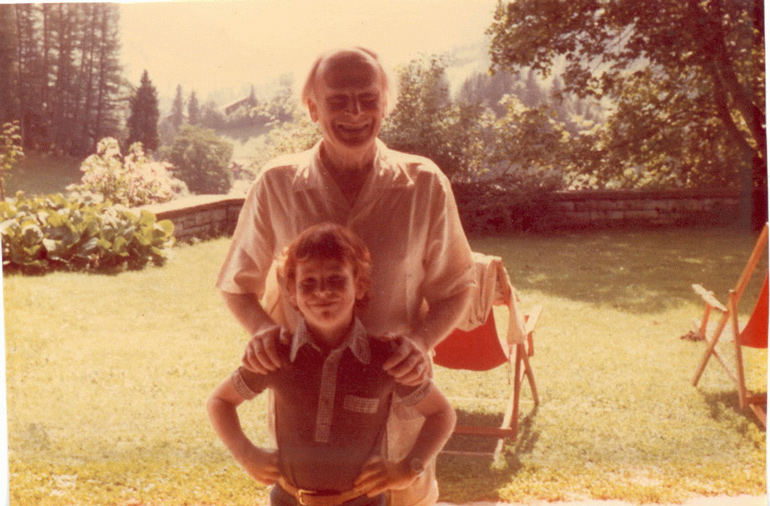
After fleeing political oppression in South Africa, Violinist Daniel Hope reveals how Yehudi Menuhin took his family in, and changed his life forever.
Yehudi Menuhin would have been 100 years old this year, on April 22nd, 2016. His career as both a violinist and conductor was the stuff of legends. As a human being, he was just as legendary.
Of all the musicians he touched over his lifetime, the story of how British violinist Daniel Hope stepped into the life of Yehudi Menuhin is arguably one of the most extraordinary tales of becoming in the classical music world.
I caught up with Daniel Hope by phone from his Hotel in Ottawa last week, to talk about the deeply personal relationship he shared with Yehudi Menuhin. This is what happened…
LV: You’ll be in Toronto at the end of the month to perform a tribute concert to Yehudi Menuhin, your mentor. I wanted to talk to you about your personal connection to him, and how that came about?
DH: We were thrown together by great luck and fortune. My parents are from South Africa. My father, a writer, was a fiercely anti-apartheid activist and campaigner. We were forced to leave the country and received exit visas, which meant that we had to submit our passports and could never return. We ended up in Europe – firstly in Paris, then London where we quickly ran out of money. My Mother had trained as a secretary and tried to go out and find a job. She couldn’t find anything really suitable. One day she met a Director of a temp. agency and he said, “I think I might have something for you.” She had two offers: one was as secretary to the Archbishop of Canterbury, and the other one was the secretary to Yehudi Menuhin. She had heard Menuhin when she was a teenager, and decided to try for the job. It was only supposed to be a temporary job but it ended up lasting 24 years.
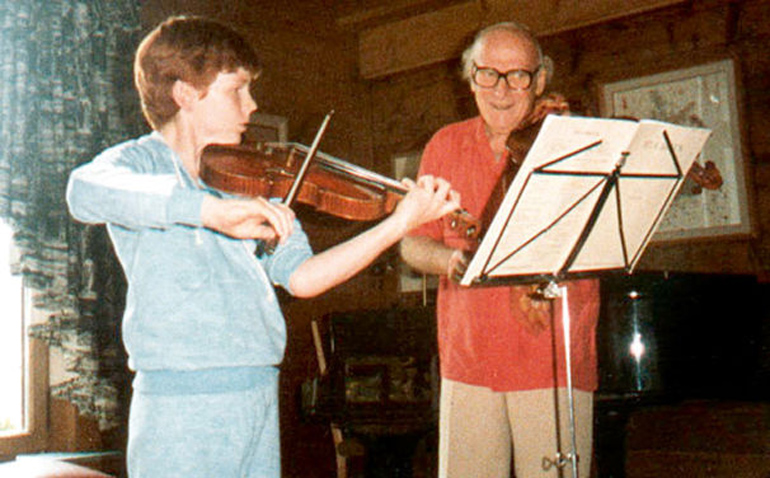
LV: When did you get to meet him?
DH: When I was a baby she would take me to work with her every day. I spent the first seven or eight years growing up in his house. I would play there with his grandchildren and he would take us with him on tour. We went to Gstaad, (Switzerland) where he had a summer festival. He became part of our family, and we became part of his family very quickly.
LV: When did you start playing violin?
DH: I was four when I announced to my parents that I wanted to be a violinist. They weren’t that surprised. I had been surrounded by music since the time I was born. I spent those first few years absorbing every kind of music. That was the most amazing thing about Menuhin. He was one of the great classical musicians, but was open to all styles. I had the experience of listening to people like Ravi Shankar, Stephane Grappelli, at very close quarters. At the same time, I heard Wilhelm Kempff and Mstislav Rostropovich. The diversity of Menuhin’s musical love opened up so many possibilities for me as a young child. It was incredible.
LV: What Memories stick out most for you?
DH: That would be my summers in Gstaad, as well as the many great people that came to the house. I will never forget Ravi Shankar coming in with his whole entourage of players, including Alla Rakha, one of the great Tabla players. I also remember the church where the rehearsals took place. It was the first time I listened to orchestras, and violin concertos. The Zurich Chamber Orchestra were in residence there. It was my first experience with Vivaldi’s Four Seasons, Bach and Mozart Concertos. Hearing Menuhin play those was an absolute revelation. I remember sitting down on the grass outside the house and performing. There were many memories like that in my first seven or eight years.
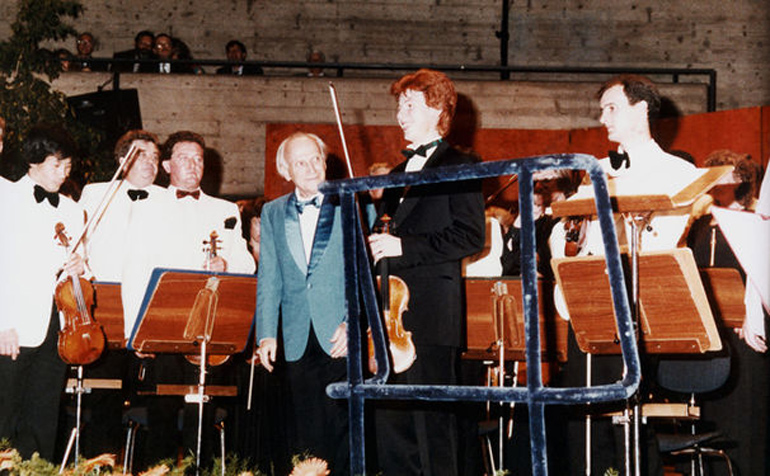
LV: You performed with Menuhin over 60 times leading up to his final public performance in Düsseldorf a few days before he died in 1999. What happened that day?
DH: Performing with him started when I was about 16. He had been so close to us, and was my mother’s boss so at the beginning there was a feeling of caution there. I went my own way and it was not until I started studying with Zakhar Bron that he took interest. He wanted to know what Bron could do, and asked to hear me. It was from that point on, after playing for about ten years that he realized that I had taken it seriously and made me an offer to go on tour with him conducting these pieces. What then ensued for me was an amazing learning curve of being able to perform these pieces.
That final concert I remember extremely well. What was different was that after the performance of the concerto he would send you back out on stage to play an encore. Earlier that particular night, we’d been traveling and talking a lot. I had come across a recording of his that I had listened to as a kid, which was a piece by Ravel [“Kaddish” from Deux mélodies hébraïques] which he played incredibly. I reminded him of this recording and told him that it had meant a great deal to me. After the performance, he gestured to me to play the encore but he didn’t leave the stage which is something he’d never done. Instead he went and sat on stage in the back of the first violins. Of course I saw this, which was very unusual for him to do, so I thought I would play a different encore than the Bach, or whatever it was… I decided to play Ravel’s “Kaddish” as a tribute to him. He was thrilled. As we walked off the stage he gave me a few tips, as well as some different fingerings I could do – that was how we was. No one knew that five days later he would die, so it was a coincidence that it was the “Kaddish” (which is the Jewish Prayer for the dead). It was a beautiful piece of music. A piece that I associated very deeply with Menuhin. But in a sense that it was a very poignant tribute which I was lucky enough to be able to do.
LV: How did Menuhin influence your technical development?
DH: What I learned from Menuhin was the performance experience, playing the great concertos night after night, and working on them, discussing them. There were of course many technical suggestions but it was more than that. It was more like a kind of a training in a sense. He was picking up something that I had worked on for months and years with Bron and he adapted it by giving his invaluable experience on pieces that he had played for 70 years. That for me was an extraordinarily lucky privileged position in which to find oneself. Someone in their early twenties just starting out to play big pieces on tour. To learn something from him and to gather that experience was an incredible gift.
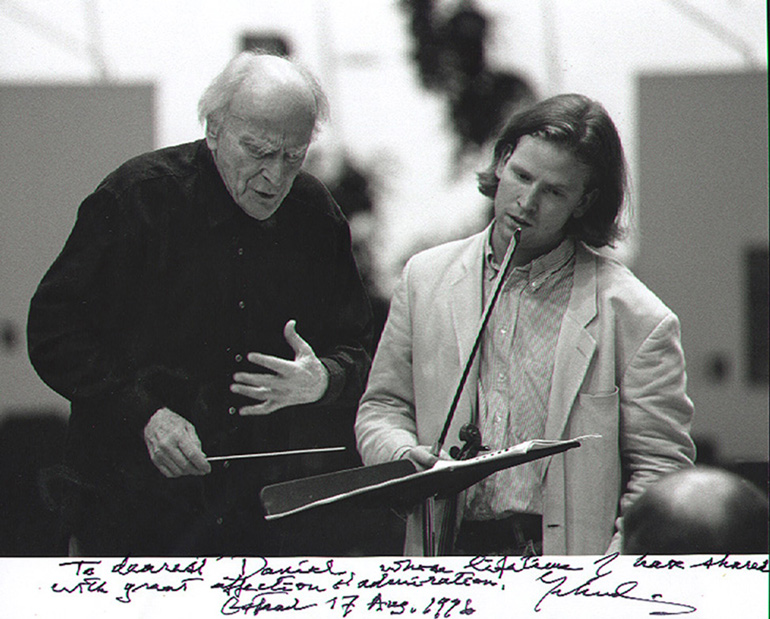
LV: I took a look at the programme for the upcoming Menuhin@100 and it is interesting to see all the repertoire relating to Menuhin. Can you talk a little bit about how you chose them?
DH: The Bach Sonata [Violin Sonata No. 4 in C Minor, BWV 1017] was one of his favorite pieces which he also selected to record with Glenn Gould – that famous television recording that they did. It was a piece we talked about at length during many journeys around the world. It was a piece that fascinated him. He thought it was not played enough by violinists, who tend to go for the solo Sonatas. He thought that it embodied the essence of Bach, which is why I knew it had to be part of the programme somehow. It was also the piece that we had the most soul searching about.
The Enescu [Impromptu concertant] of course. Being his teacher, and being probably the greatest influence on him than any musician I would say. There are so many pieces with Menuhin that you could put together 25 programmes and go on for days. I always try to find a programme that is coherent within itself so the third Sonata of Enescu would have been a great choice but then again it’s a massive piece so I decided instead to go for the early Enescu who is also someone very much undiscovered – very much into a Wagner frame of mind – extremely lyrical, extremely expressive and romantic – it is a little jewel of a piece that reflects the kind of romantic elements in both Menuhin and Enescu’s playing.
The Mendelsohn [Sonata in F Major] is a piece he discovered – the Sonata and D minor Concerto and the two manuscripts he discovered in the 1950’s, and they’re both terrific pieces. Mendelsohn meant an enormous amount to Menuhin. It was the Mendelsohn Concerto that he selected when he came back to Berlin after the war. Together with Beethoven and Brahms, with Mendelsohn it was a piece that in the sense he returned to Germany because of the big band. It was clear to me that there would be a strong link in the programme.
The Walton Sonata was commissioned by Menuhin in order to help a friend of Walton’s who had taken ill and Walton needed money to pay for her treatment. So Menuhin, in a very savvy way, got a Sonata out of him. It’s an extremely beautiful piece. Walton really thought about Menuhin’s way of expression when he wrote it.
And then Bartòk Romanian Folk Dances was one of Menuhin’s warhorses as a young man, and his contact with Bartòk through the solo Sonatas which he commissioned plus the second violin concerto. He felt deeply attached and in awe of Bartòk. I thought this was a nice way to round off the programme.
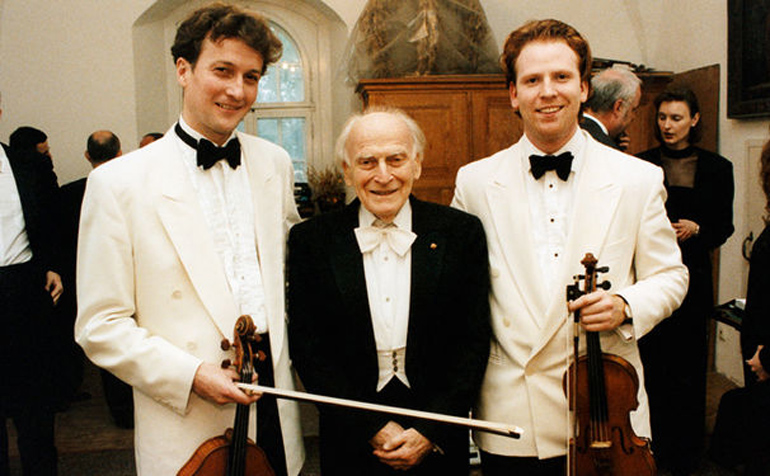
LV: Last time I saw you in Toronto was for Max Richter’s Vivaldi Recomposed Four Seasons, at Koerner Hall. The space was absolutely illuminated that night. Do you have any impressions on Koerner Hall from a performer’s perspective?
DH: I absolutely love it! I think it’s one of the greatest concert halls in the world. This will be my third time. I came back in April of last year to play piano quartets with Wu Han (piano), and Paul Neubauer (viola). I was able to experience it in the chamber music setting but also in the orchestral setting and I think that it is absolutely incredible. The sound is magnificent. It’s a big hall and yet it has the elements of being intimate, which I think is what always makes a great hall. You have the feeling that it’s a major hall and yet you can reach the people through pianissimo, and visually it’s stunning. I’m absolutely thrilled to bring this programme there.
LV: Besides the tribute next week in Toronto, do you have any other plans to celebrate Menuhin’s birthday this year?
DH: The entire year I’m doing tribute shows around the world. I’m also doing the album this year as well. It’s an extension of this programme and it encompasses other works that Menuhin either commissioned or had written for him, or pieces that I played with him such as the Vivaldi B minor Double. It’s the beginning of a year in calibration of Menuhin.
LV: Tell me more about the CD. When will it be released?
DH: It’s called “My Tribute to Yehudi Menuhin” on Deutsche Grammophon and we’ll release it at the very beginning of February.
LV: Looking forward to it and thanks for sharing your personal memories of Yehudi Menuhin with us.
#LUDWIGVAN
Want more updates on Toronto-centric classical music news and review before anyone else finds out? Ffollow us on Facebook for all the latest.
- THE SCOOP | Royal Conservatory’s Dr. Peter Simon Awarded The Order Of Ontario - January 2, 2024
- THE SCOOP | Order of Canada Appointees Announced, Including Big Names From The Arts - December 29, 2023
- Ludwig Van Is Being Acquired By ZoomerMedia - June 12, 2023



